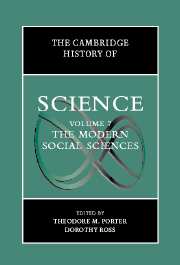Book contents
- Frontmatter
- 1 Introduction: Writing the History of Social Science
- PART I SCIENCES OF THE SOCIAL TO THE LATE NINETEENTH CENTURY
- PART II THE DISCIPLINES IN WESTERN EUROPE AND NORTH AMERICA SINCE ABOUT 1880
- 13 Changing Contours of The Social Science Disciplines
- 14 Statistics and Statistical Methods
- 15 Psychology
- 16 Economics
- 17 Political Science
- 18 Sociology
- 19 Anthropology
- 20 Geography
- 21 History and the Social Sciences
- PART III THE INTERNATIONALIZATION OF THE SOCIAL SCIENCES
- PART IV SOCIAL SCIENCE AS DISCOURSE AND PRACTICE IN PUBLIC AND PRIVATE LIFE
- Index
- References
13 - Changing Contours of The Social Science Disciplines
from PART II - THE DISCIPLINES IN WESTERN EUROPE AND NORTH AMERICA SINCE ABOUT 1880
Published online by Cambridge University Press: 28 March 2008
- Frontmatter
- 1 Introduction: Writing the History of Social Science
- PART I SCIENCES OF THE SOCIAL TO THE LATE NINETEENTH CENTURY
- PART II THE DISCIPLINES IN WESTERN EUROPE AND NORTH AMERICA SINCE ABOUT 1880
- 13 Changing Contours of The Social Science Disciplines
- 14 Statistics and Statistical Methods
- 15 Psychology
- 16 Economics
- 17 Political Science
- 18 Sociology
- 19 Anthropology
- 20 Geography
- 21 History and the Social Sciences
- PART III THE INTERNATIONALIZATION OF THE SOCIAL SCIENCES
- PART IV SOCIAL SCIENCE AS DISCOURSE AND PRACTICE IN PUBLIC AND PRIVATE LIFE
- Index
- References
Summary
The disciplines recognized in the twentieth century as the social sciences emerged from older branches of knowledge by a process of separation and negotiation between related and overlapping areas of interest. As Theodore Porter points out, some of these lines of inquiry had been relatively continuous genres of writing for centuries, but they were often strands in broader traditions of knowledge and practice — chiefly philosophy, history, and affairs of state — and they were part of the intellectual equipment of liberally educated people, rather than occupations for specialists. Beginning in some cases earlier, but more conspicuously in the late nineteenth and early twentieth centuries, they formed into fields to which specialists devoted their principal efforts and sites for research, reflection, and training. This modern idea of disciplines itself emerged over the course of the nineteenth century, a product of increasing specialization in science, scholarship, and technical expertise; the research ideal pioneered in German universities; and the reconstruction of higher educational systems and administrative institutions in Europe and the United States. University training and credentialing was especially important in solidifying the existence of continuing communities of specialized scholars.
We should not overemphasize the rapidity or pervasiveness of this transformation. In Europe, disciplinary organization was never as firmly established nor as important to the production of social knowledge as it was in the United States; and even there, the course of development was uneven. Still, specialized disciplines became a basic feature of the human sciences in the twentieth century and, particularly after the Second World War, an international pattern of intellectual organization.
- Type
- Chapter
- Information
- The Cambridge History of Science , pp. 203 - 237Publisher: Cambridge University PressPrint publication year: 2003
References
- 16
- Cited by



